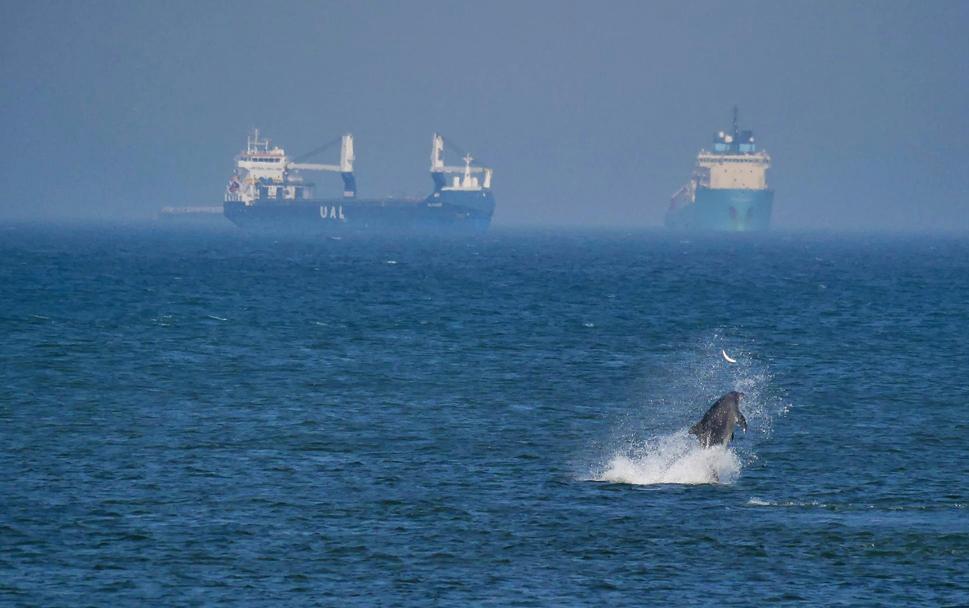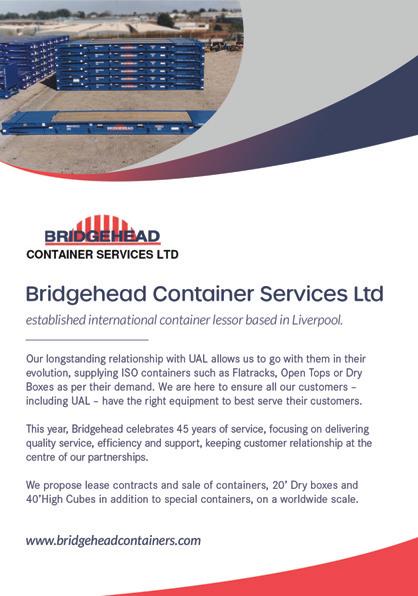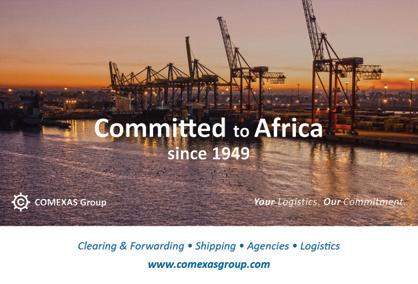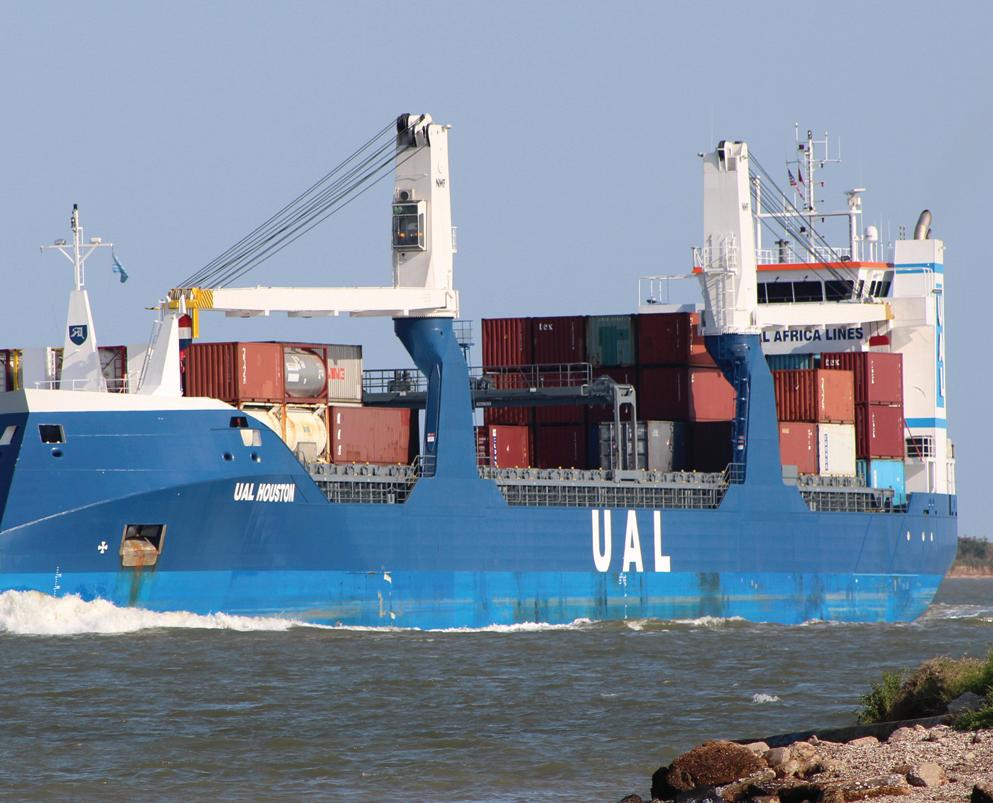
8 minute read
Sailing bravely where others fear to tread
UNIVERSAL AFRICA LINES I PROFILE
Africa, as it is sometimes said, is not for the weak. It is a place full of unique challenges and hard-working people, but it also offers vast opportunities for those who are sufficiently brave and determined. Universal Africa Lines has established itself as a specialist, niche provider of shipping services to the especially challenging West Africa region. Dennis Malkoc, Business Development Head, spoke to Richard Hagan about what it takes to master the African seas.
Advertisement
There’s no getting around it: Doing business in Africa is far from easy. Generally speaking, the continent lacks basic infrastructure and government services that are commonplace in more developed nations. The political landscape is awash with instability and many economies are undeveloped.
But despite it all, Africa’s people are hardworking, tenacious, and they want a better future for themselves and their families, just like anyone else. They are entrepreneurs and visionaries and they are ready to work for a better life. It is truly a vast, often untapped pool of optimism and hope.
When Roger Jungblut came to West Africa in the early 1970s, it was to see the circumstances there for himself and to quantify the challenges faced by the region. He witnessed the lack of infrastructure first hand, but he also saw the opportunity presented by the area’s growing oil and gas industry and the fact that Nigeria did not have a sea link with Houston, where much of the local industry’s equipment would need to come from.
And so, in 1973 he set up Universal Africa Lines (UAL) to create that missing sea link.
A unique niche
Today, UAL is a specialist cargo carrier focused on hauling oil and gas industry cargo, and project freight, from Europe and the US to West Africa. The company has recently also added a shipping lane from the Mediterranean to West Africa.
From its headquarters in Rotterdam, its contingent of 40 specialist staff ensures that its vessels are kept busy, safe, and on schedule at all times.
In addition to its Rotterdam facility, UAL has sister companies in Houston, Aberdeen and Denmark who are each in charge of the specific shipping lanes that depart from those regions. The Denmark-based office is the newest addition to the UAL, family and is responsible for chartering opera-
tions in general, and more specifically for the company’s new Mediterranean route.
UAL’s two most important destinations are Nigeria and Angola. UAL is the only direct Multi-Purpose Vessel (MPV) liner service connecting the US and Europe with West-Africa.
“99% of the time when your cargo is shipped with UAL, it will remain on board until we reach the final destination as per the clients wishes,” explained UAL’s Head of Business Development, Dennis Malkoc.
“No transhipments are made unless the final destination has certain restrictions such as low draft. For that we use our very own UAL – owned K5 terminal located on the island of Bioko in Equatorial Guinea, which is a free zone and has been part of the UAL family since 2000. A prime example is our service to Malongo port in Angola with our own UAL Lobito from Malabo.”
Conducting business operations on a continent without the political continuity and infrastructural stability of more developed nations, calls for extreme levels of flexibility and an ability to make decisions on the fly. According to Mr Malkoc, the company’s philosophy revolves around its flexibility.
“We are the only MPV liner service with direct routes from the US Gulf and Europe to West Africa. Because of that we have quick and reliable transit times.”
Assets on the water
The company’s impressive fleet of eight ships has been carefully developed to ensure that it can deliver maximum value for its clients at all times and on all routes.
First up is M/V UAL Lobito. This breakbulk cargo ship is specifically designed for the West-African feeder business. Built in 2003 with a very shallow draft, she is the perfect vessel to reach those hard to reach ports/places. Her two cranes have an individual capacity of 36 tonnes and a combined lifting capacity of 70, serving her cargo capacity of 6,258 cbm.
Next we have the 2011 built M/V UAL Africa. This breakbulk vessel, with a 10,774 cbm cargo capacity and two cranes, (each able to hoist 60 metric tonnes or 120 metric tonnes combined), is the sister ship to the company’s MV UAL Bodewes – built in 2012 and boasting the same capabilities. UAL Africa, Bodewes and Houston all feature ultra-modern, wave-piercing X-Bow type hull designs.
Seeing the success of Africa and Bodewes, the company added the aforementioned MV UAL Houston, built in 2012. Her 11,970 cbm in bale grain capacity is facilitated by two cranes on her port side. Individually the cranes can hoist 60 metric tonnes, and 120 when combined. It is the sister ship to the company’s MV UAL Cologne and MV UAL Texas, built in 2014, although Cologne and Texas have two cranes with 80 metric tonnes capacity. And just like UAL Africa and Bodewes, they feature X-Bow hulls.
These vessels are categorised as green vessels, due to them lowering UAL’s
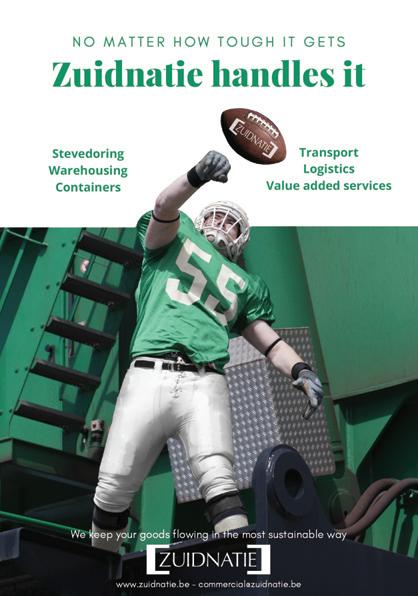
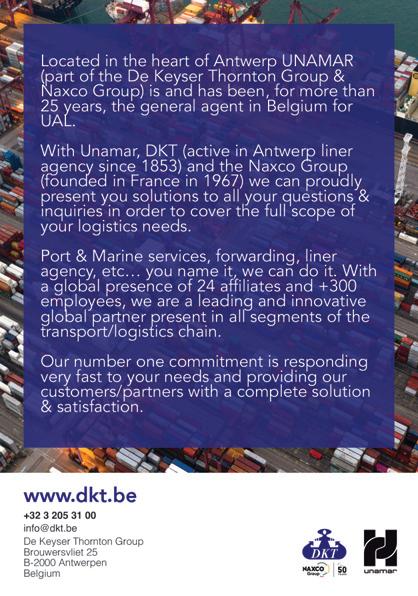
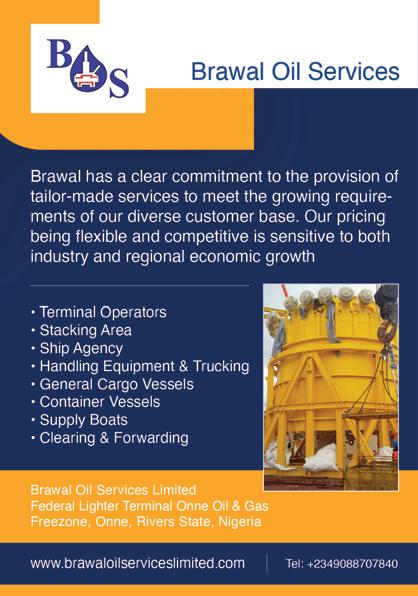
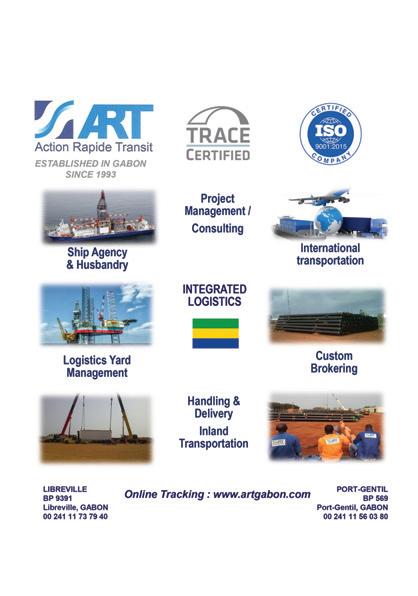
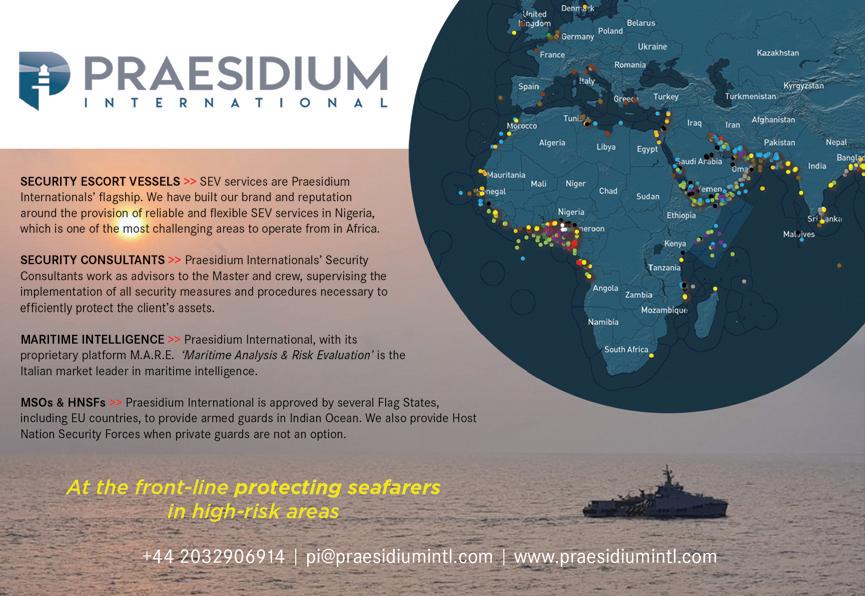
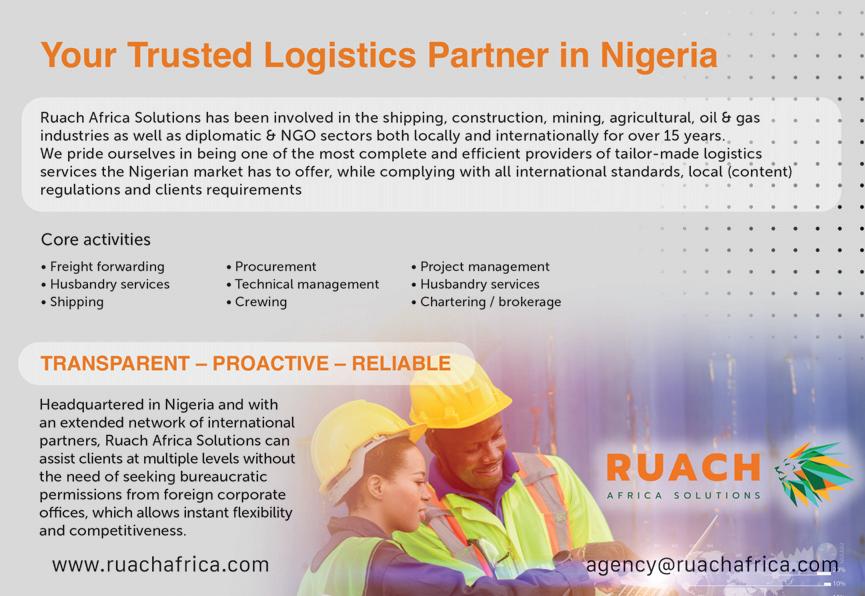
UNIVERSAL AFRICA LINES I PROFILE
carbon footprint and offering fuel savings of 30% compared to industry standards. UAL was one of the first to implement this revolutionary design within the MPV market.
“Over the last couple of years, UAL has seen a growing need in heavy lifts so we decided to invest in the massive cargo ship M/V UAL Fortitude, built in 2008, designed to take on some of the bigger shipments,” said Mr Malkoc. “With a 15,952 cbm bale/ grain capacity and her two cranes offering a combined hoisting capacity of 360 metric tonnes, she is equipped for every challenge.”
And finally, in January, UAL welcomed an eighth vessel to its fleet: the 138m long M/V UAL Manitoba was built in 2007 at Jiangdong Shipyard in China and boasts a cargo hold capacity of 15,953 cbm. Her two massive cranes offer 120 metric tonnes of lifting capability each, for a combined 240 metric tonnes.
“In addition to our own fleet, we always look at the long-term charter market to add additional tonnage in support of our fleet,” remarked Mr Malkoc. “Currently we have four chartered vessels added to our fleet.
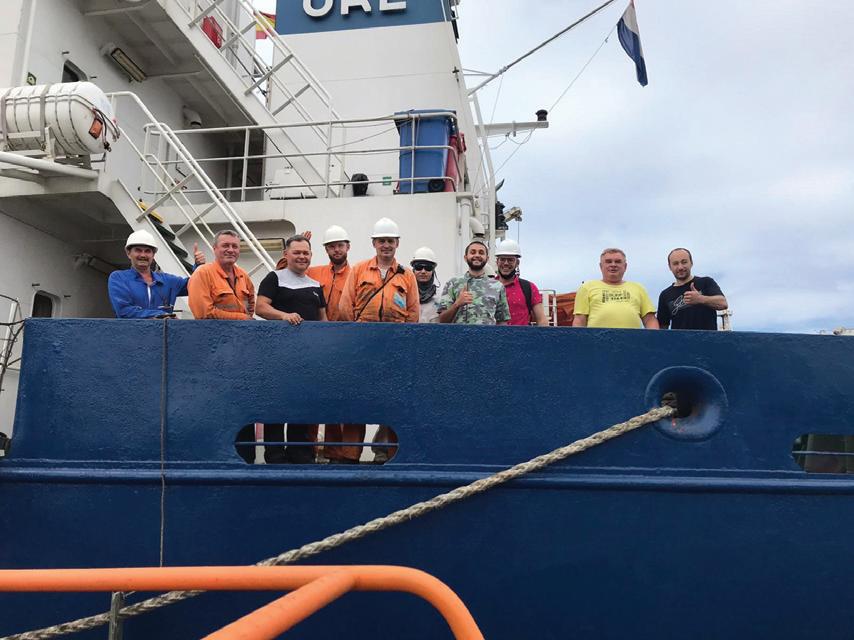
Africa: not for the weak
According to Mr Malkoc, UAL’s business model benefits from a widely-held perception that doing business in Africa is difficult and problematic.
“For a lot of our European and US clients, Africa equals problems and a lot of risk. They’re afraid of the risks of doing business there,” he said. “We’ve been working in Africa for so long that it now gives us a special edge in terms of what we can offer our clients versus our competitors. We go to ports that our competitors don’t and won’t go to.”
In its almost 50 year history of working in West Africa, UAL has developed relationships with local agents. It’s critical to the company’s success in the region.
“We have a strong network of local agents who we choose carefully and with whom we’ve worked for a long time,” Mr Malkoc confirmed.
This network is particularly instrumental in the company’s efforts to secure its ships, its seafarers and its cargo against the biggest ongoing regional challenge facing its assets: piracy.
“The Gulf of Guinea has a lot of piracy problems; it’s the main problem we face,” noted Mr Malkoc. “We’ve had our share in the past. It’s a fact of doing business in the area and we have to prepare the best that we can.
“There are three important measures we adopt. First off, we have a strong and reliable agent in each country; next, we follow the local government and security company rules and regulations to the letter; and finally, we don’t take unneces-
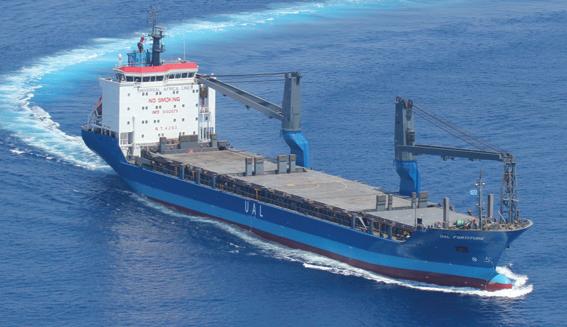
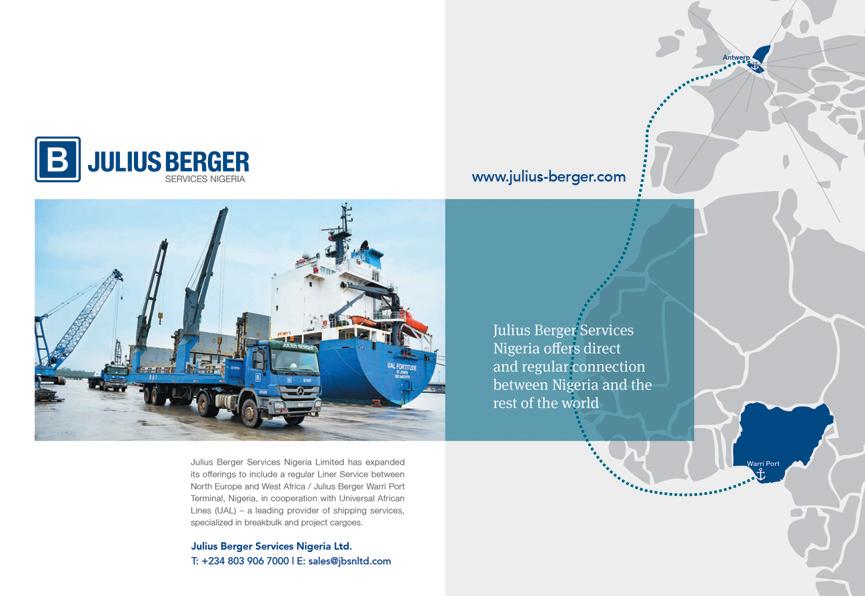
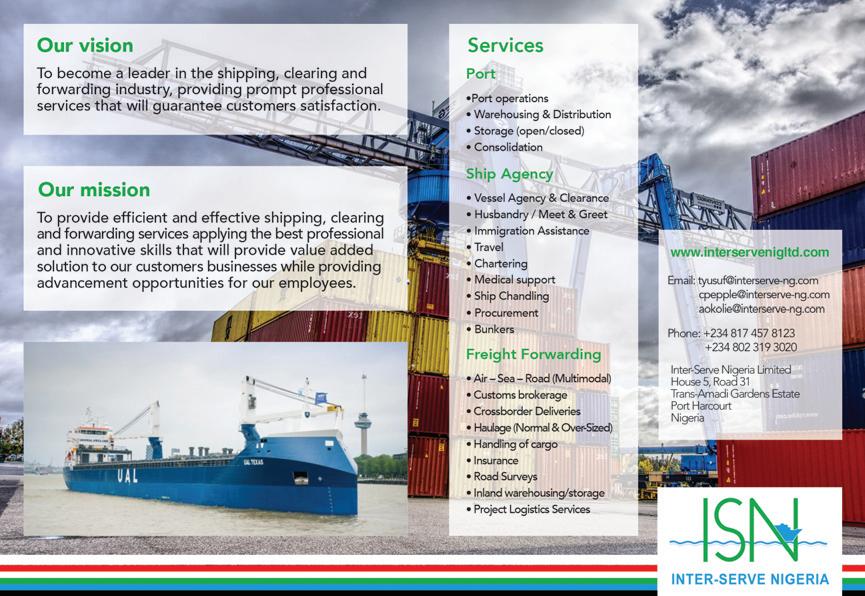
UNIVERSAL AFRICA LINES I PROFILE
sary risks. If, for example, you know that you’re nearing a piracy hot zone, then avoid it. Absorb the extra miles. Don’t be a ‘cowboy’,” Mr Malkoc stressed.
Local and international navies provide ongoing anti-piracy patrols in the region as well as convoy escorts to protect commercial vessels transiting the area. UAL also retains the services of maritime risk control service provider Praesidium International to review, implement and assess security measures onboard UAL ships as well as to train its seafarers. Where necessary, armed guards and security escort vessels are employed to safeguard its vessels as well.
On the back of a buoyant global maritime freight trade, UAL had a highly successful 2021 and is looking forward to an equally positive 2022.
“There is high demand for our services in our shipping lanes, so we urge our clients to plan ahead and contact us well in advance to avoid possible delays on their projects,” Mr Malkoc concluded. n
